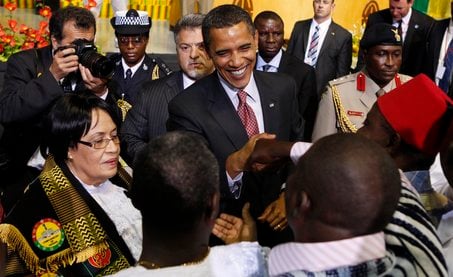Obama to Engage Africa in 2011

President Barack Obama following his address to the Ghanaian Parliament in Ghana, July 2009. (AP Photo/Charles Dharapak)
Yesterday the Associated Press ran an interesting article on President Obama’s plans to increase engagement with Africa in 2011.
President Barack Obama is quietly but strategically stepping up his outreach to Africa, using this year to increase his engagement with a continent that is personally meaningful to him and important to U.S. interests. Expectations in Africa spiked after the election of an American president with a Kenyan father. But midway through his term, Obama’s agenda for Africa has taken a backseat to other foreign policy goals, such as winding down the Iraq war, fighting the Taliban in Afghanistan and resetting relations with Russia. Obama aides believe those issues are now on more solid footing, allowing the president to expand his international agenda. He will focus in Africa on good governance and supporting nations with strong democratic institutions.
The article notes that 2011 will see 30 elections on the African continent, including Sudan, Zimbabwe and Nigeria. Each of these will pose challenges for U.S. policy. In addition, the following issues are come to mind:
- On overemphasis on elections alone is never a good way to gauge the health of any democracy. The day-to-day effectiveness, transparency and representative qualities of institutions are indicators of how well a democracy is doing. Elections garner the headlines but as important as they are, they remain necessary but not sufficient.
- Another persistent problems with elections is to focus on outcomes (who got elected?) instead of process (were the elections free and fair?). The U.S. should be as focused on the latter as possible – and should assist is setting up sustainable processes that meet the free-and-fair standard.
- Truly supporting the development of governing institutions is a long-term process; projects and policies toward this end cannot be tied to short-term events.
- How with the recently-released Quadrennial Diplomacy and Development Review’s recommendations affect the ways in which the U.S. supports the development of democratic institutions? It appears that a substantial amount of the democratic development machinery and expertise currently at USAID might be moved to the State Department.
- Will the U.S. (via USAID and/or State) be so constrained by federal budget challenges that any new initiatives in Africa become nearly impossible?
- What role, if any, will the new leadership in the U.S. House of Representatives play in shaping U.S. policy toward Africa in 2011?
